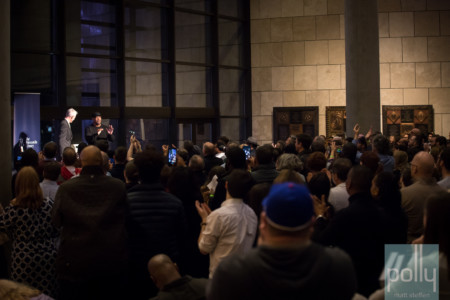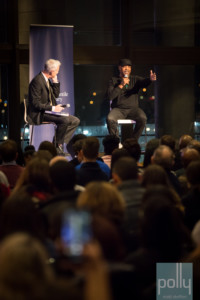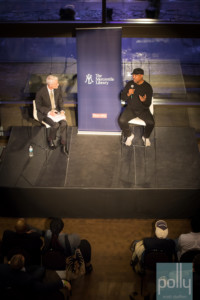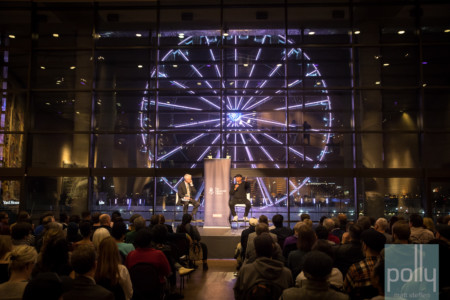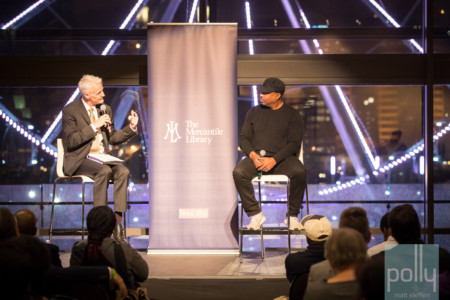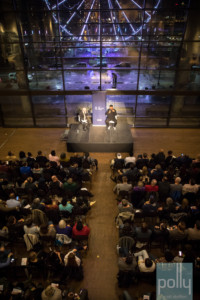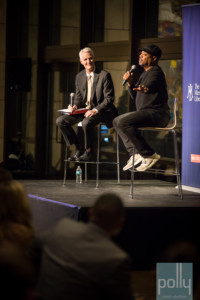words & photography | MATT STEFFEN
The first time I saw Chuck D perform was with Public Enemy in 1992. We borrowed one of our parents’ minivans and sneaked out of the suburbs—I’m sure they had no idea where we were going. We squeezed into Bogart’s and quickly realized we were in over our heads. The place was packed with full-sized adults. Everyone was eyeing each other, and the tension was hanging thick. The room went dark. Flava Flav jumped into the lone spotlight with his trademark clock hanging around his neck. The room exploded. About 15 seconds later, I caught a Chuck Taylor to the face, and my nose followed suit.
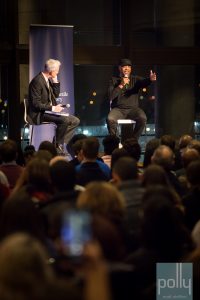 Public Enemy was on tour for their third LP, Fear of a Black Planet. Chuck D’s booming voice was fronting a crew who set themselves apart from the typical scene of beats, bragging, and one-upmanship. They were introducing a new style of music of politics and frustration to the world. They were saying what a lot of people were thinking and were doing it in style, with middle fingers raised.
Public Enemy was on tour for their third LP, Fear of a Black Planet. Chuck D’s booming voice was fronting a crew who set themselves apart from the typical scene of beats, bragging, and one-upmanship. They were introducing a new style of music of politics and frustration to the world. They were saying what a lot of people were thinking and were doing it in style, with middle fingers raised.
Yo Bum Rush the Show, their shot across the bow, was released three years earlier in a time of Reagan and the Cold War, Iran-Contra scandal, Jim Bakker, radios blaring I Wanna Dance with Somebody and BAD, and America gulping down Prozac and Full House episodes. Public Enemy let everyone know they were busting through the side door since they weren’t allowed through the front. There was a disconnect happening in this country that needed to be illuminated.
Fast forward a few decades, and Chuck D is still wielding that spotlight. He has mellowed with age but hasn’t missed a beat. When called for, that boom can now relax into a smooth snarl more fitting for his current surroundings, the National Underground Railroad Freedom Center, where for an evening, he addressed the prevailing questions: Are we better off now? Have things gotten better?
Chuck D took us back to the beginning; he’s a historian. Eschewing the Instagram mentality of broad but superficial knowledge, he dug through the deep tracks. Civil War to WWI, DW Griffith and the tools used as stumbling blocks for a people just getting back on their feet, Frank Robinson, and growing up in Roosevelt where bragging about being smart was cool.
Deep divers tend to have limited topics, but Chuck D doesn’t seem to be living with those constraints. He can list NBA stats, knows who played bass on The Isley Brothers debut album, and how to keep a handle on his social media channels. He speaks about the folly of chasing celebrity. “Fame is fake, because it fades.” How having never met your “friends” on Facebook tends to run alongside never having met your “enemies” that you hear about on the news—you just know you don’t want “them” in your neighborhood. And how this illusion of connectedness has created a super fine line between reality and fantasy, and that fine line is technology. We’re a world of netizens but at the same time illiterate. We are distracted from the changes going on only to realize what’s happened when the final outcome has already arrived. The technology can be Birth of a Nation distributed to a newly united post World War Europe, instilling stereotypes of racial separation before anyone could even get a chance to meet each other and form their own notions.
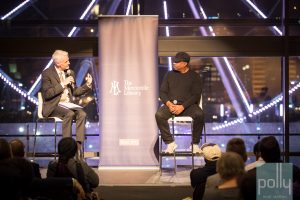 The evening wasn’t all doom and gloom; Chuck D spoke about technology and science being the last crusade against a complete fall into mythology. While it may be the job of governments to draw lines and divide people, there is a glue in Music. We all speak it, and it’s still evolving. The next generation is witnessing it, sight, sound, story, and style, in four equal, inseparable components. We can evolve with it or be left behind. Maybe most importantly, he spoke about being present—looking up from your phones, not falling for the distractions of fame and celebrity, avoiding that natural urge to flock with birds of your feather. Have conversations with humans, not with stereotypes. Make friends with people that don’t look like you.
The evening wasn’t all doom and gloom; Chuck D spoke about technology and science being the last crusade against a complete fall into mythology. While it may be the job of governments to draw lines and divide people, there is a glue in Music. We all speak it, and it’s still evolving. The next generation is witnessing it, sight, sound, story, and style, in four equal, inseparable components. We can evolve with it or be left behind. Maybe most importantly, he spoke about being present—looking up from your phones, not falling for the distractions of fame and celebrity, avoiding that natural urge to flock with birds of your feather. Have conversations with humans, not with stereotypes. Make friends with people that don’t look like you.
The Mercantile Library invited Chuck D to Cincinnati to let him speak his mind. Overwhelming response demanded a change of venue and then an additional simulcast. The people wanted to hear what the man has to say, and what a crowd it was. The musicians were there—Hip Hop and Americana in equal numbers. The photographers paced about. The film buffs, the chefs and restauranteurs, entrepreneurs, and cogs in the non-profit wheels. Grade-school-aged kids sat next to grandparent-aged kids in all tints and shades. It was reassuring. Maybe “Have things gotten better?” isn’t the right question. Some things have; some have not, and it almost seems a little too pendulous to gauge. Maybe that’s a question impossible to answer without more time and historical context. “Are we still fighting the good fight?” might work better. And more specifically, “What are you doing about it?”

